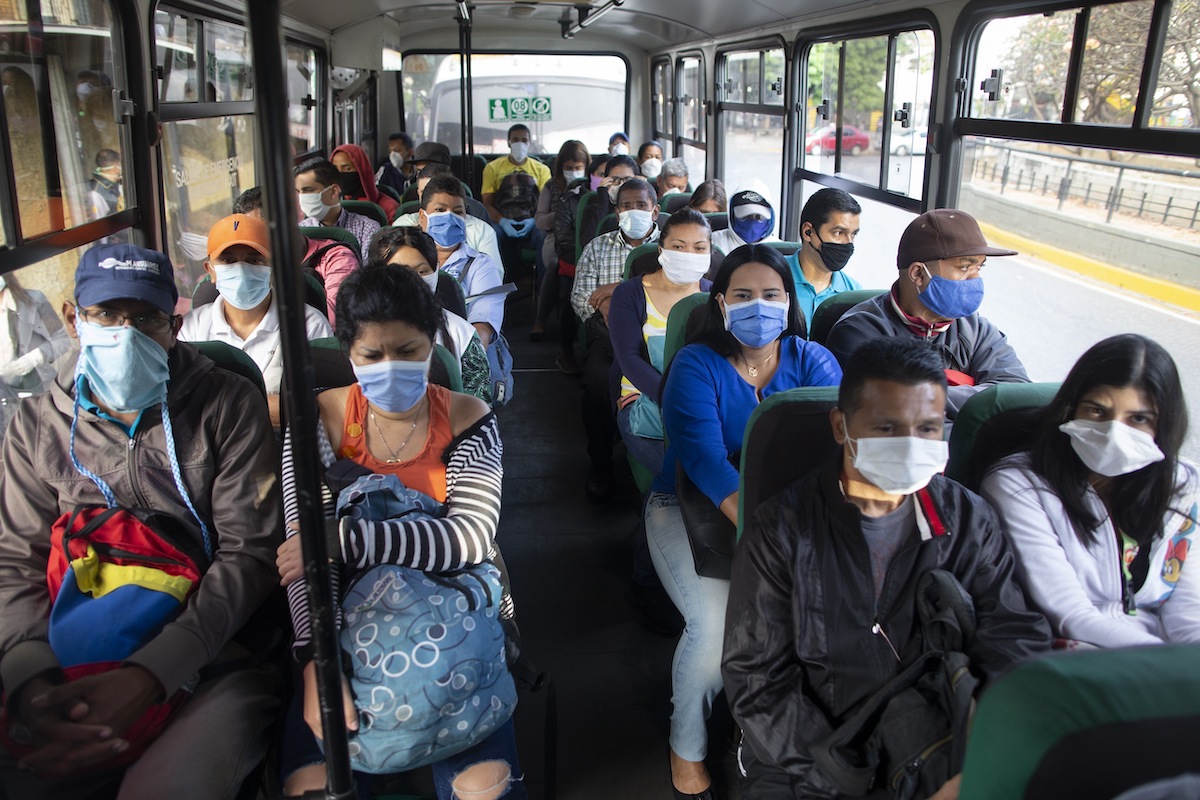

People wearing protective masks as a precaution against the spread of the new coronavirus travel on a bus in Caracas, Venezuela, Tuesday, March 17, 2020. (AP Photo/Ariana Cubillos)
By JOSHUA GOODMAN, Associated Press
MIAMI (AP) — Venezuela said Tuesday it is seeking an emergency $5 billion loan from the International Monetary Fund, appealing to an institution it has long vilified to cope with the fallout from the new coronavirus on its already collapsed oil economy.
The request came in a letter to IMF Managing Director Kristalina Georgieva signed by President Nicolás Maduro.
Venezuela is believed to be the first country to try to tap the $50 billion in financing the IMF has available to help developing nations deal with the virus, and the appeal underscores the precarious state of the socialist government’s finances.
But approval may be hard to come by if the U.S., which is the biggest shareholder and has a veto over major decisions at the Washington-based lender, balks at assisting a Maduro government it no longer recognizes and accuses of stealing billions from its own people.
“The Bolivarian government is taking different preventive measures and following thorough, strict and exhaustive controls to protect the Venezuelan people,” according to the letter, which is dated March 15 and was published Tuesday on Foreign Minister Jorge Arreaza’s Twitter account.
“For this reason, we are turning to your honorable organization to request its evaluation about the possibility of authorizing Venezuela a financing line of $5 billion from the emergency fund of the Rapid Financing Instrument.”
President @NicolasMaduro has formally requested financing for $5 million to the International Monetary Fund to strengthen the response capacity of our health system during the #COVIDー19 contingency. Another timely action to protect the people. pic.twitter.com/UAX0DJ6McS
— Jorge Arreaza M (@jaarreaza) March 17, 2020
While Venezuela’s exposure to the coronavirus has so far been limited —with just 33 cases confirmed— the potential economic damage from the disease has the entire country of around 30 million on edge.
Even before the virus’ outbreak, Venezuela’s oil industry was on its knees. Severe sanctions applied last year by the Trump administration nearly halved oil production and worsened a humanitarian crisis that has pushed nearly 5 million people to flee the country.
Now the country will have to contend with oil prices at a multi-year low amid a meltdown in oil markets that followed Saudi Arabia’s decision to flood the market to retaliate against Russia’s refusal to go along with a proposed OPEC production cut. Making matters worse, most of the added supply from Saudi Arabia is of the same heavy crude variety that Venezuela produces.
The request is an about-face for Maduro, who for years refused to share economic data with the Washington-based lender and just last month condemned it as a tool of U.S. imperialism. In the past he has called the IMF a blood-sucking “assassin” responsible for plunging millions of people into poverty across Latin America.
The IMF set up the rapid financing instrument in 2011 as a one-time, short-term loan aimed at helping low-income countries absorb shocks like natural disasters. The amount a country can requested is restricted to 100% of the country’s quota at the IMF —about $5 billion in Venezuela’s case— and is supposed to be less comprehensive than traditional loans.
However, countries with debt levels the IMF deems unsustainable are barred from taking out loans. Such could be the case of Venezuela, which has defaulted on more than $65 billion in bonds and owes billions more to Russia, China and dozens of foreign energy companies whose assets it expropriated over the past two decades.
For the loan to be approved, the IMF must also weigh in on Venezuela’s political impasse. The U.S. leads a group of more than 50 nations that recognize opposition leader and head of congress Juan Guaidó as Venezuela’s rightful leader after it accused Maduro of fraud in 2018 presidential elections. While the IMF hasn’t recognized Guaidó, like the Inter-American Development Bank does, the Trump administration could lean heavily on the institution to prevent it from accessing fresh funds.


